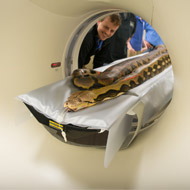
Team had to coil 18-foot-long snake in half
US vets have carried out a pioneering CT scan on a reticulated python.
Staff at Columbus Zoo and Aquarium in Ohio suspected that 20-year-old Hanna was suffering from a respiratory infection after noticing some swelling on her face.
“As you can imagine, a serious infection in a 135-pound snake can present some challenges—even in one as gentle as Hanna,” said the Zoo’s vice president of animal health, Dr Randy Junge.
“Even though Hanna is 18 ¾ ft. long, her scan took only a few minutes. Staff had to coil her a bit and scan her from both ends, but they were able to image her entire body length in great detail.”
The team had previously used radiographs to assess Hannah’s lungs and airways. However, x-rays do not of a very good job of showing detail in reptiles.
This year, the veterinary team had the option of using its new CT scanner, which provides much more detail and is not affected by structures like skin and scales.
From the CT scan, the animal care team were able to see that the swollen area was caused by glandular tissue. Hanna was placed on antibiotics for two weeks and the animal care team reports that she appears to be doing well.
Image (C) Graham S. Jones and Columbus Zoo and Aquarium



 The latest
The latest